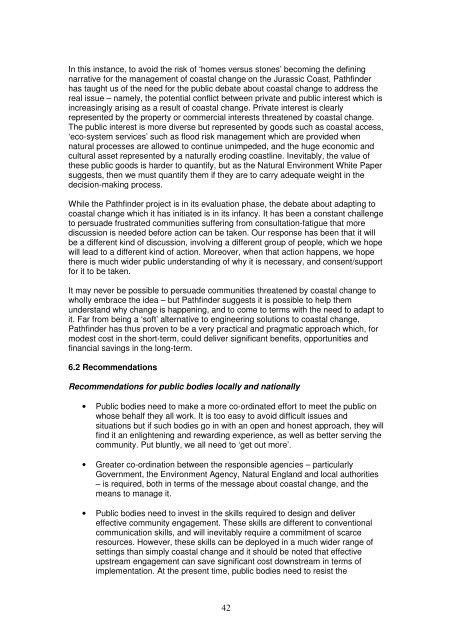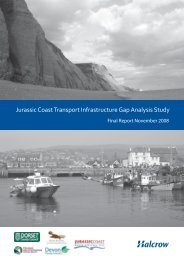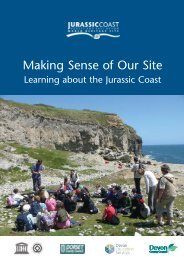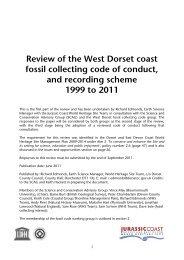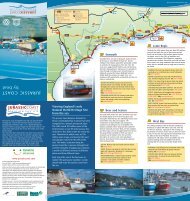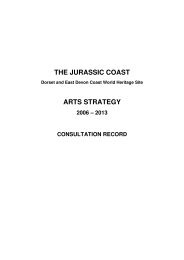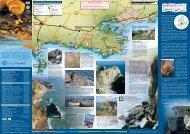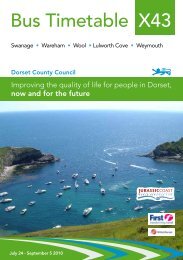Final Report to DEFRA - Jurassic Coast
Final Report to DEFRA - Jurassic Coast
Final Report to DEFRA - Jurassic Coast
You also want an ePaper? Increase the reach of your titles
YUMPU automatically turns print PDFs into web optimized ePapers that Google loves.
In this instance, <strong>to</strong> avoid the risk of ‘homes versus s<strong>to</strong>nes’ becoming the defining<br />
narrative for the management of coastal change on the <strong>Jurassic</strong> <strong>Coast</strong>, Pathfinder<br />
has taught us of the need for the public debate about coastal change <strong>to</strong> address the<br />
real issue – namely, the potential conflict between private and public interest which is<br />
increasingly arising as a result of coastal change. Private interest is clearly<br />
represented by the property or commercial interests threatened by coastal change.<br />
The public interest is more diverse but represented by goods such as coastal access,<br />
‘eco-system services’ such as flood risk management which are provided when<br />
natural processes are allowed <strong>to</strong> continue unimpeded, and the huge economic and<br />
cultural asset represented by a naturally eroding coastline. Inevitably, the value of<br />
these public goods is harder <strong>to</strong> quantify, but as the Natural Environment White Paper<br />
suggests, then we must quantify them if they are <strong>to</strong> carry adequate weight in the<br />
decision-making process.<br />
While the Pathfinder project is in its evaluation phase, the debate about adapting <strong>to</strong><br />
coastal change which it has initiated is in its infancy. It has been a constant challenge<br />
<strong>to</strong> persuade frustrated communities suffering from consultation-fatigue that more<br />
discussion is needed before action can be taken. Our response has been that it will<br />
be a different kind of discussion, involving a different group of people, which we hope<br />
will lead <strong>to</strong> a different kind of action. Moreover, when that action happens, we hope<br />
there is much wider public understanding of why it is necessary, and consent/support<br />
for it <strong>to</strong> be taken.<br />
It may never be possible <strong>to</strong> persuade communities threatened by coastal change <strong>to</strong><br />
wholly embrace the idea – but Pathfinder suggests it is possible <strong>to</strong> help them<br />
understand why change is happening, and <strong>to</strong> come <strong>to</strong> terms with the need <strong>to</strong> adapt <strong>to</strong><br />
it. Far from being a ‘soft’ alternative <strong>to</strong> engineering solutions <strong>to</strong> coastal change,<br />
Pathfinder has thus proven <strong>to</strong> be a very practical and pragmatic approach which, for<br />
modest cost in the short-term, could deliver significant benefits, opportunities and<br />
financial savings in the long-term.<br />
6.2 Recommendations<br />
Recommendations for public bodies locally and nationally<br />
• Public bodies need <strong>to</strong> make a more co-ordinated effort <strong>to</strong> meet the public on<br />
whose behalf they all work. It is <strong>to</strong>o easy <strong>to</strong> avoid difficult issues and<br />
situations but if such bodies go in with an open and honest approach, they will<br />
find it an enlightening and rewarding experience, as well as better serving the<br />
community. Put bluntly, we all need <strong>to</strong> ‘get out more’.<br />
• Greater co-ordination between the responsible agencies – particularly<br />
Government, the Environment Agency, Natural England and local authorities<br />
– is required, both in terms of the message about coastal change, and the<br />
means <strong>to</strong> manage it.<br />
• Public bodies need <strong>to</strong> invest in the skills required <strong>to</strong> design and deliver<br />
effective community engagement. These skills are different <strong>to</strong> conventional<br />
communication skills, and will inevitably require a commitment of scarce<br />
resources. However, these skills can be deployed in a much wider range of<br />
settings than simply coastal change and it should be noted that effective<br />
upstream engagement can save significant cost downstream in terms of<br />
implementation. At the present time, public bodies need <strong>to</strong> resist the<br />
42


